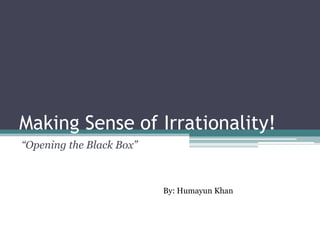Making sense of irrationality
- 1. Making Sense of Irrationality! ŌĆ£Opening the Black BoxŌĆØ By: Humayun Khan
- 2. Who is this ŌĆ£Homo EconomicusŌĆØ? ŌĆóSupremely RATIONAL ŌĆó Examines Evidence ŌĆó Conducts a cost/benefit analysis before making a decision
- 3. Introducing ŌĆ£Homo SapiensŌĆØ ŌĆóŌĆ£Homo EconomicusŌĆØ model not disproved because we ŌĆ£SOMETIMESŌĆØ make mistakes. ŌĆóThe proof lies in that in certain circumstances, we ŌĆ£ALWAYSŌĆØ make mistakes.
- 4. Amos Tversky& Daniel KahnemanŌĆō The Founders of Behavioural Economics
- 5. Question ŌĆó A bat and ball cost $1.10 in total. The bat costs $1 more than the ball. How much does the ball cost?
- 6. Two Modes of Thinking ŌĆó ŌĆ£I feel it in my GUT!ŌĆØ Vs. ŌĆó ŌĆ£Use your HEAD!ŌĆØ
- 7. Key Points to Take Away ŌĆó Representative Heuristic or The Rule of Typical Things ŌĆó Availability Heuristic or The Example Rule ŌĆó Mental Accounting Ō¢½ Sunk Costs
- 8. Read This! ŌĆó Linda is a 31 years old, single, outspoken, and very bright. She majored in Philosophy. As a student, she was deeply concerned with issues of discrimination and social justice, and also participated in anti-nuclear demonstrations
- 9. Ask yourselvesŌĆ” How likely is it that she is: A) Bank Teller B) Bank Teller active in the Feminist Movement
- 10. How it worksŌĆ” ŌĆó If it looks like one, than it is oneŌĆ” ŌĆó This heuristic uses past learning to make decisions in the present, and predict the future, in the face of illogical thinking.
- 11. Ask yourselvesŌĆ” Which one causes more deaths? a) Smoking b) H1N1
- 12. Are you more likely to be killed by? a) b)
- 13. 30% more likely to be killed by falling Airplane Parts ŌĆó Forget ŌĆ£JAWSŌĆØ, think more ŌĆ£RUDDERŌĆØŌĆ”
- 14. How it worksŌĆ” ŌĆó When people are asked to judge how frequently something occur, people consult their memories for examples ŌĆó The easier it is for you find an example of an event, the MORE LIKELY or FREQUENT you think it isŌĆ”
- 15. Why canŌĆÖt you get a cab on a rainy day?
- 16. What to do with all that birthday money? ŌĆó Pay rent, phone bill, utilities bill, cable billŌĆ”NAWWWWWWŌĆ”ŌĆ” ŌĆó How about alcohol, ipod, itouch, laptop, blackberry, or some new clothesŌĆ”SOUNDS MORE LIKE IT
- 17. How it worksŌĆ” ŌĆó The concept of mental accounting states, that the source of the money affects how it is spent. Pay Check OSAP Scholarship Gift Money ŌĆó So, when the cab driver makes his daily amount in a few hours, he closes the mental account and goes home, rather then work his shift and make extra money
- 18. ImagineŌĆ” You arrive at a theatre and discover that you lost your ticket. Would you pay another $10 to buy another ticket?
- 19. Now, ImagineŌĆ” ŌĆó You are going to the play but havenŌĆÖt bought your ticket in advance. When you arrive at the theatre you realize you have lost a $10 bill. Would you still buy a ticket?
- 20. Sunk Costs ŌĆó Costs that have already been incurred and which cannot be recovered to any significant degreeŌĆ”
- 21. ThatŌĆÖs All for Now ŌĆó I hope you now know or at least have started to wonder about, why we donŌĆÖt make sense (all the time, that is).
- 22. References: ŌĆó Kahneman, Daniel, Paul Slovic, and Amos Tversky. Judgment Under Uncertainty: Heuristics and Biases. Cambridge, UK: Cambridge University Press, 1982. ŌĆó Gardner, Dan. Risk: Why we fear the things we shouldnŌĆÖt ŌĆō and put ourselves in greater danger. Toronto, Ontario: McClelland & Steward Ltd., 2008






















